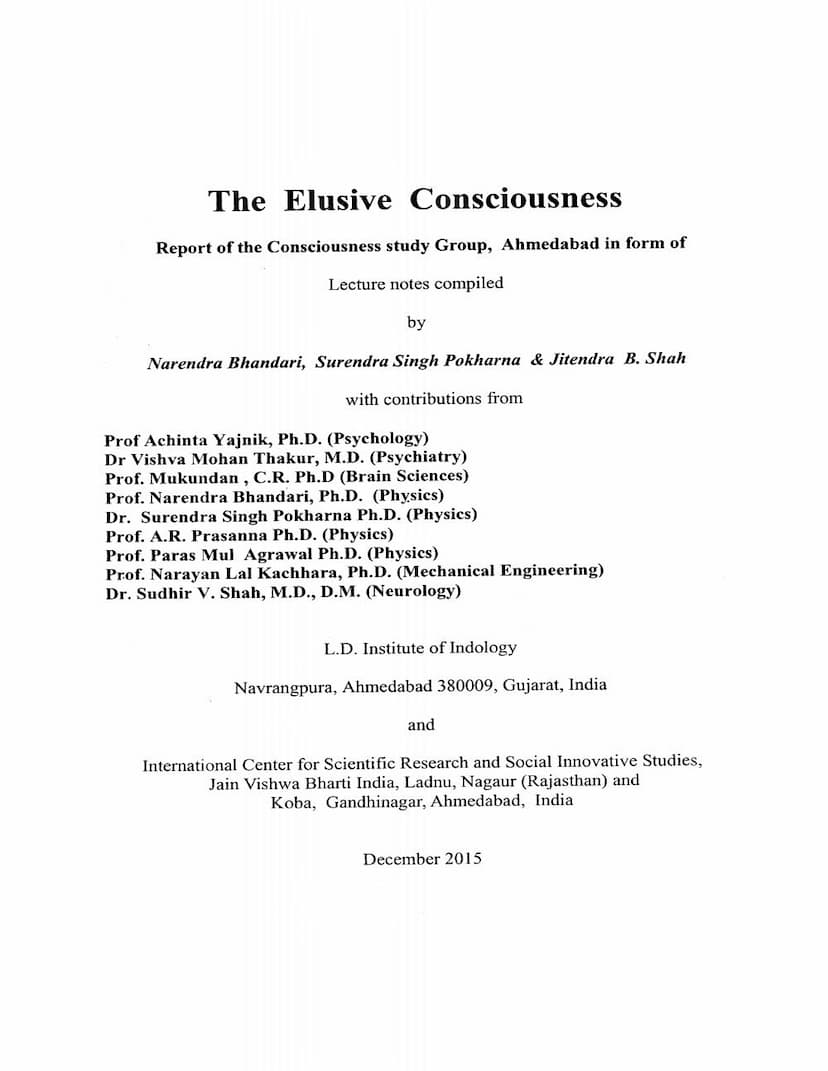Elusive Consciousness
Added to library: September 1, 2025

Summary
This comprehensive summary details the book "Elusive Consciousness," a collection of lecture notes compiled by Narendra Bhandari, Surendra Singh Pokharna, and Jitendra B. Shah, with contributions from experts in various fields. The book explores the multifaceted nature of consciousness, integrating Eastern philosophical traditions, particularly Jainism, with modern scientific understanding.
Core Themes and Contributions:
The book delves into the concept of consciousness from diverse perspectives, highlighting the limitations of purely materialistic or reductionist scientific approaches and suggesting the need for a more holistic, consciousness-centric view. Key themes include:
- Spiritual Theory of Personality (Eastern & Western Perspectives): Professor Achinta Yajnik discusses how Western mechanistic science has led to an "existential vacuum" and a loss of meaning, contrasting it with Eastern philosophies that offer a holistic, consciousness-based understanding of human personality. She emphasizes the need for a rational and scientific spiritual theory.
- Consciousness as Fundamental: Dr. Vishva Mohan Thakur argues that consciousness is the most fundamental entity, with spacetime, matter, and fields being secondary, derived from consciousness. He critiques the lack of a successful physicalist theory of consciousness and suggests that matter is a "humbler product of consciousness."
- Scientific Understanding from Reality Engagements: Professor C.R. Mukundan explores consciousness as an entity or energy that enlivens matter, with ancient philosophical origins that resonate with modern scientific concepts of energy. He contrasts philosophical views of consciousness as a universal force with the neuroscientific understanding of consciousness as a state of wakefulness, noting the importance of objective verification in scientific study.
- Time and Space: Real and Relative: Professor A.R. Prasanna examines the scientific understanding of time and space, discussing their relationship to consciousness. He highlights Einstein's theories of relativity and contrasts them with ancient Hindu scriptures that measure time across vast scales, suggesting that time itself might be relative to different beings and their speeds.
- The Elusive Truth: Limitations of Knowledge and Jain Logic: Narendra Bhandari and Surendra Singh Pokharna introduce Jain principles like Anekāntavāda (non-absolutism) and Syādvāda (contextual perspective), which emphasize the multifaceted nature of reality and the limitations of any single viewpoint. They draw parallels between these concepts and Gödel's Incompleteness Theorems, suggesting that complete knowledge requires an understanding beyond purely scientific methodologies. They also highlight the experimental evidence for wave-particle duality in quantum physics as a scientific parallel to the Jain understanding of reality.
- General Systems Theory, Quantum Physics, Relativity, Neurophysiology, and Jainism: Surendra Singh Pokharna proposes that these diverse fields, along with Jain concepts, can provide new paradigms for knowledge and evolution. He points out the limitations of applying methodologies developed for closed physical systems to open, dynamic biological and human systems. He suggests that Jainism's emphasis on consciousness and its evolution, potentially linked to reduced entropy production, offers a valuable alternative perspective to Darwin's "survival of the fittest." He also draws analogies between quantum field theory and Jain karma theory, and explores the possibility of quantum processes underpinning consciousness.
- Quantum Mechanics and Human Decision Making: Dr. Paras Mul Agrawal discusses how quantum mechanical models can explain human decision-making processes that defy classical probability theories, citing the "disjunction effect" as an example. He suggests the applicability of quantum mechanics to fields like economics, finance, and management.
- Soul (Jiva) and Consciousness in Jainism: Dr. Narayan Lal Kachhara provides a detailed explanation of the Jain concept of the soul (Jiva) as a sentient, non-corporeal, eternal substance with attributes of consciousness. He differentiates between the pure soul and the impure, embodied soul bound by karmas. He elaborates on the 47 powers of the soul as described in Jain literature, highlighting its intrinsic attributes like consciousness, knowledge, bliss, and spiritual energy.
- Prolonged Fasting: A Hypothesis: Dr. Sudhir V. Shah presents a hypothesis to explain seemingly impossible feats of prolonged fasting, like that of Shri Hira Ratan Manek (H.R.M.) who fasted for 411 days. The hypothesis involves chronic adaptation of the body, deriving energy from cosmic sources (primarily solar energy) via the pineal gland and other mechanisms, efficient energy utilization and recycling, and potential genetic predispositions.
- Can a Person Live Without Food and Water for 75 Years: A Case Summary: Dr. Sudhir V. Shah also summarizes the case of Prahladbhai Jani, a yogi who claimed to have lived without food or water for many years. Medical observations confirmed the genuineness of his fasting, but the exact scientific explanation remained elusive, hinting at extraordinary physiological and potentially spiritual capabilities.
Overall Message:
"Elusive Consciousness" posits that a comprehensive understanding of consciousness requires integrating scientific inquiry with philosophical and spiritual insights, particularly from ancient Indian traditions like Jainism. The book challenges purely materialistic views and advocates for a broader, consciousness-centric approach to unraveling the mysteries of existence, knowledge, and human potential. It suggests that by exploring these interdisciplinary connections, humanity can gain new perspectives on fundamental questions and potentially address contemporary global challenges.